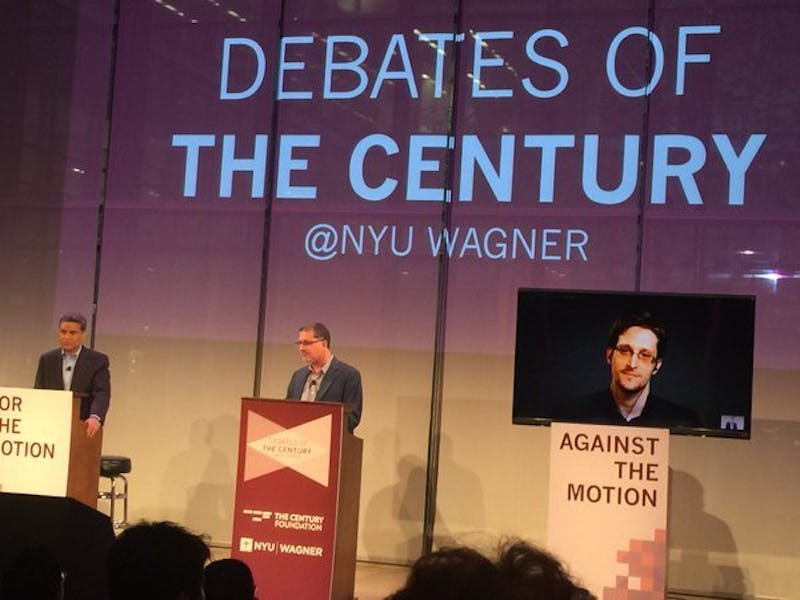Snowden at NYU Encryption Debate With CNN's Zakaria: "Key to Everything" Shouldn't Exist
"We can get around [encryption], if we are patient, if we are careful..."

Any debate in the United States that includes Edward Snowden, who leaked troves of classified information to Glenn Greenwald and Laura Poitras in 2013, is bound to look a little unusual. Snowden is currently in Russia on indefinite asylum as he remains sought on espionage charges by federal authorities. Nonetheless, televised, he took to the stage at New York University on Tuesday to debate CNN’s Fareed Zakaria on how the government should respond to the security challenges posed by encryption.
The debate focused on whether law enforcement should be able to access any and all encrypted communications as long as it had a court order, a question that has only become more pressing with major messaging apps WhatsApp and Viber recently boosting their users’ privacy with end-to-end encryption. Zakaria argued that a court order should authorize the government to seize any information it requires and that obstructing this process amounts to a threat to national security. He said that a fully encrypted bank would allow embezzlers a safe haven from any kind of investigation.
“I understand within a democracy, you have to sacrifice liberty for democracy at some point,” Zakaria said, according to The Intercept. “You cannot have an absolute zone of privacy.”
Snowden responded by pointing to the inherent technological challenges in making all encrypted data available for the taking. He argued that what amounts to a “backdoor” to encryption would never be truly secure in the government’s hand and would jeopardize the fundamental security of the internet.
Fareed Zakaria and a televised Edward Snowden debate encryption at NYU on Tuesday.
“For the government to unlock everything there has to be a key to everything. Every other person in the world can find that key and use it too,” he said. “It’s a fundamental problem of science.”
Encryption may pose difficulties for law encryption, but that doesn’t mean we shouldn’t accept those challenges in the greater scheme of things, Snowden argued. Law enforcement can still break into encrypted technology if it gains access by discovering passwords or even finding individual backdoors, like the FBI did with the San Bernardino iPhone.
“Encryption is not an unbreakable wall,” Snowden said. “Or if it is, it is one we can get around, if we are patient, if we are careful, if we think and plan how to go about our investigations.”
Zakaria then acknowledged that ditching encryption altogether, as a recent bill in the U.S. Senate would do, is also a poor answer to these questions, so the government will have to work to understand the obstacles faced by technology companies in accessing encrypted data.
“If WhatsApp says we literally do not know how to write this code — WhatsApp could demonstrate to a court that they don’t have to do it,” Zakaria said.
At the end, he stressed the need to address the government’s role in investigations before another major attack made any reasonable debate irrelevant in the ensuing political circus.
“We do face real threats out there. There are people out there trying to do bad things. Once they happen, the government will be given carte blanche,” he said.
As a whistleblower who has worked to curb the excesses of the post-9/11 security state, Snowden was only too happy to agree.